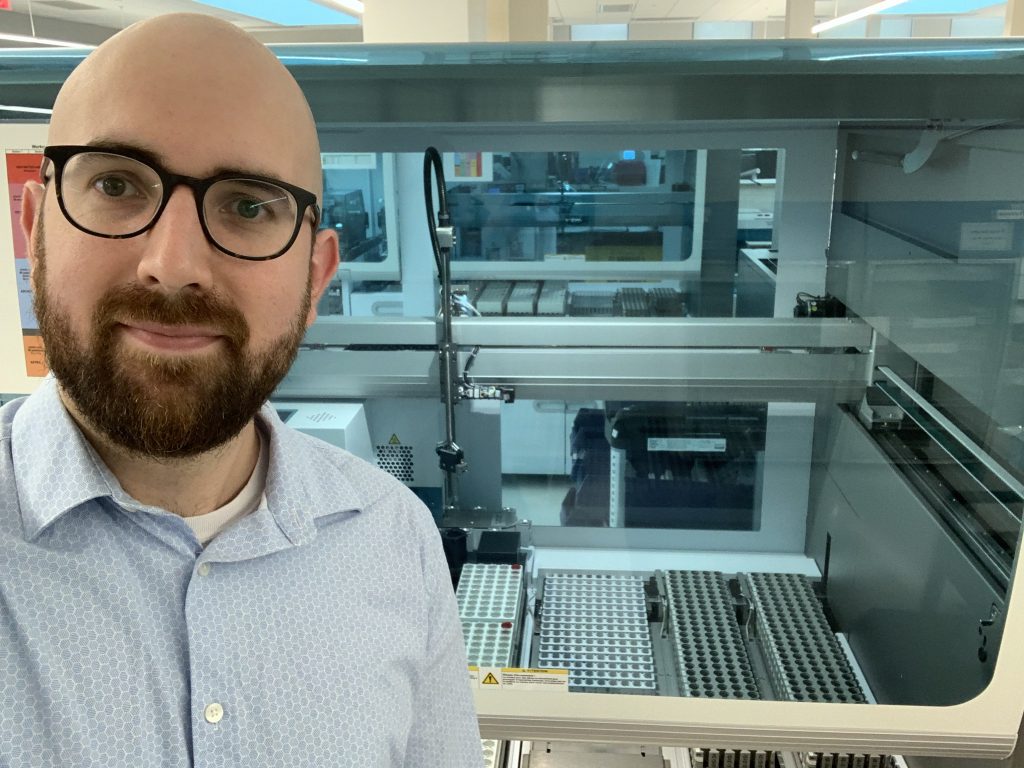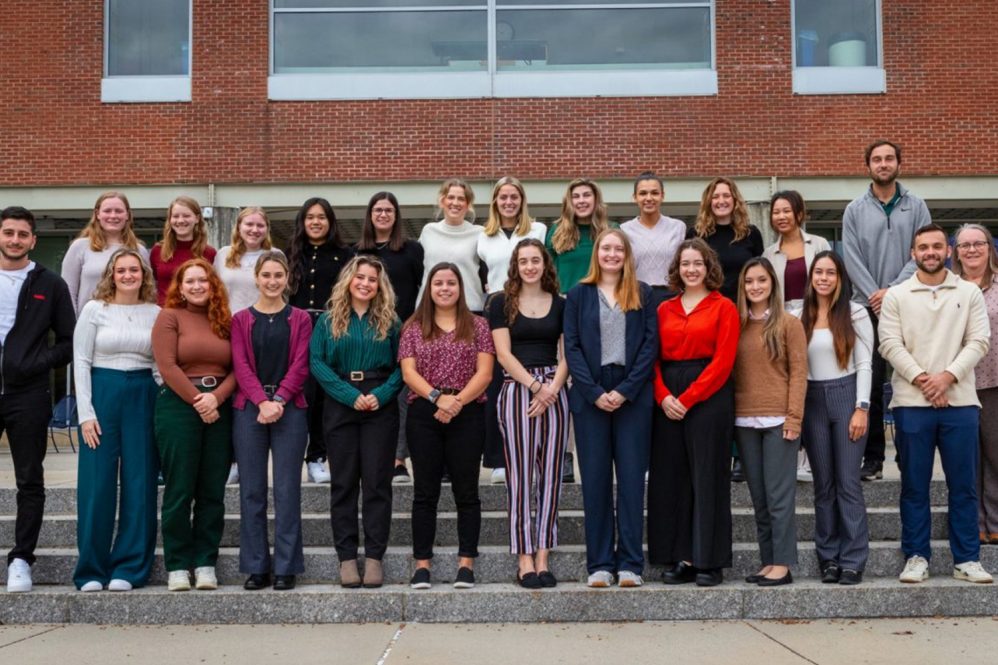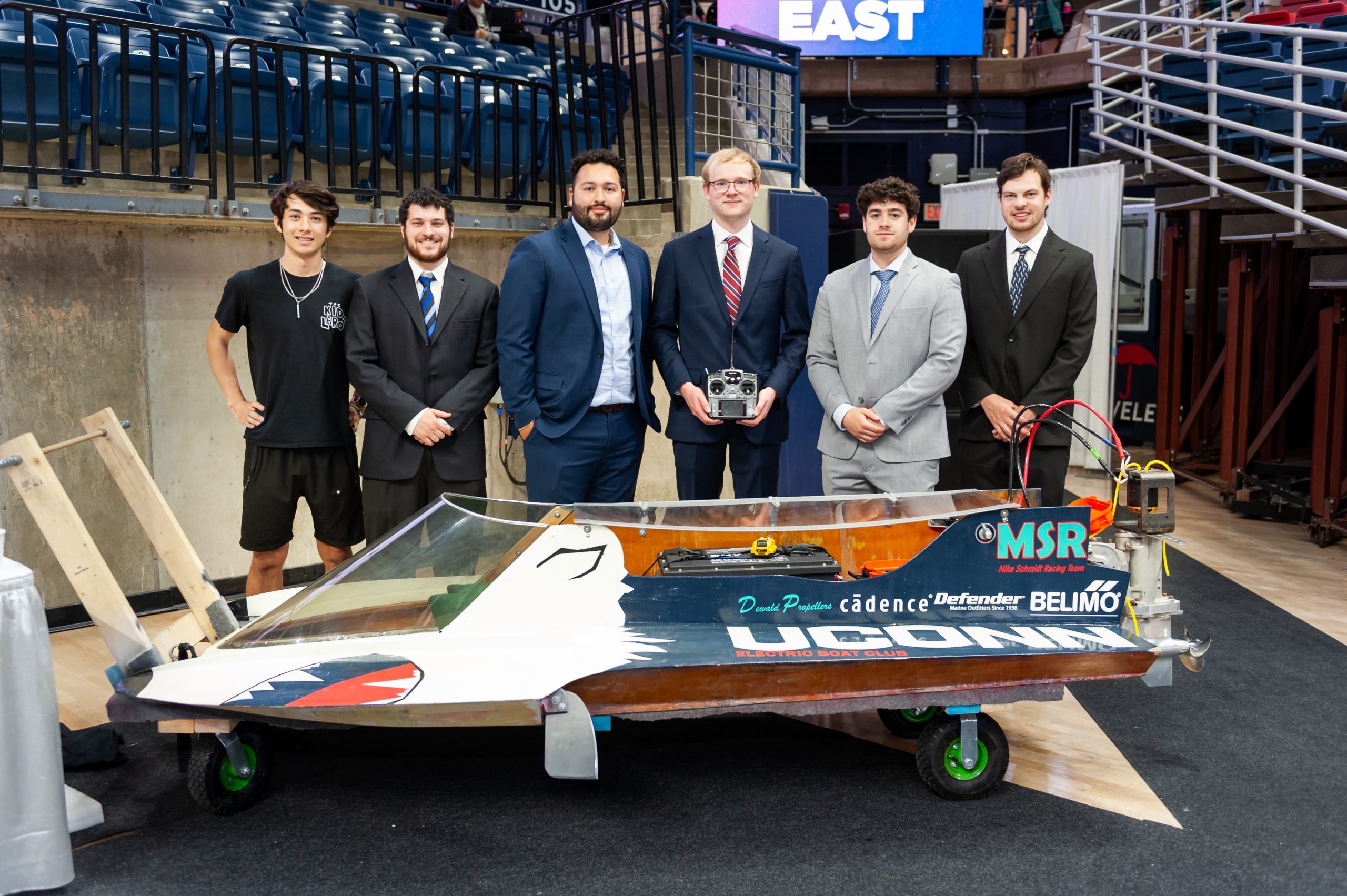During her junior year, biomedical engineering major Danielle McGeary ’07 (ENG) felt unsure about her post-UConn plans. The self-proclaimed extrovert knew her ideal work environment would involve surrounding herself with people, not being confined to a laboratory or desk. While researching her options, McGeary attended a presentation about the role clinical engineers play—working alongside doctors and nurses to make hospitals safer and more efficient.
“From that presentation on, I knew that was exactly the subset of biomedical engineering that I wanted to pursue,” she says.
McGeary then applied to UConn’s Clinical Engineering Internship Program, which immerses students in the practice of clinical engineering. Students complete 10 graduate level engineering courses (or seven plus a thesis) and work for two academic years—supported by a full tuition waiver and stipend—as a clinical engineering intern in a hospital where they perform typical clinical engineering responsibilities.
“There’s no other program like this in the country,” says David Kaputa, associate professor in residence of biomedical engineering and director of the Clinical Engineering Internship Program. “There are programs in healthcare technology management, but none have a two-year internship like we have at UConn. We’re giving them real world experience while they work towards a master’s degree.”
Clinical Engineering Internship Program

Clinical engineering students not only graduate with a M.S. in biomedical engineering, but they possess more than 1,500 hours of clinical engineering experience, two years of academic coursework, and extensive exposure to the healthcare environment and the challenges clinical engineering departments face on a regular basis.
In the past 15 years, over 150 students have graduated from the specialized program; 24 are currently enrolled.
During their internship, students may participate in technology assessment research, product evaluations including human factors engineering analysis, medical device networking, electronic medical record data integration, incident investigation, power quality analysis, healthcare technology quality improvement, among other duties. Students also attend a weeklong “internship meetings” at UConn Storrs once a semester to share stories about their experiences, listen to an expert speak about a clinical engineering issue and to participate in educational activities.
McGeary completed her internship at Hartford Hospital under the direction of Amato DeRosa, system director of information technology and biomedical engineering. “I am incredibly grateful for his leadership and guidance throughout my tenure there. I certainly would not be where I am in my career without him and his team’s willingness to mentor and train me,” McGeary says.
The internship led directly to a career. Hartford Hospital hired McGeary full time as a clinical engineer, where she stayed for five more years. While there, she provided technical support and education to clinicians and physicians for many core technologies and medical devices and functioned as a medical equipment planner for multimillion dollar construction projects. She also worked alongside information technology experts to ensure the hospital’s equipment is cybersecure and that patient data was integrated with medical software so critical health data was easily accessible to patients and clinicians.
After leaving Hartford Hospital, McGeary worked as a clinical engineering manager for Aramark Healthcare Technologies and director of clinical engineering for the Boston and Bedford, Massachusetts VA Healthcare Systems. In 2018, she became the Association for the Advancement of Medical Instrumentation’s (AAMI) first Vice President of Healthcare Technology Management. In 2020, the UConn College of Engineering elected her to the Academy of Distinguished Engineers.
“I am forever grateful for the Clinical Engineering Program, as I could not imagine doing anything else,” McGeary says. “The career is rewarding, and you get to see the direct impact of medical instrumentation and technology on patients every single day. You really feel like you are making a difference in the lives of those and the families of those who are most vulnerable. And every day is different.”
CAEE Master of Engineering in Clinical Engineering Program

While the internship program is one way to obtain a M.S., the College of Engineering’s Center for Advanced Engineering Education (CAEE) also offers a 100% remote, part-time degree path for those already working in the clinical engineering field. These students take 30 credit hours of courses while working toward earning a Master of Engineering (MENG) in biomedical engineering with a clinical engineering concentration.
Students in this program, which was established in 2017, are already expected to have a B.S. in engineering and be employed in a hospital environment.
“Since these students are already working in the field, there is no need for an internship, so the emphasis is on coursework. An advanced degree can potentially help them get promotions or help them get hired into upper-level management positions in clinical engineering,” Kaputa says.
Among the clinical engineering course options for both programs are BME 5030: Human Error and Medical Device Accidents; BME 5050: Engineering Problems in Hospitals; BME 5070: Clinical Engineering Systems; BME 5080: Medical Device Cybersecurity and others.
Ben Graham ’21 MS is the first graduate of the CAEE’s Master of Engineering in Clinical Engineering Program. He enrolled while working as a contract clinical engineer for the Defense Health Agency in Fort Detrick, Maryland.
“I was working on a certification in Clinical Engineering (CCE) and had several IT certifications at the time but felt that a master’s degree would give me more opportunities to advance,” Graham says. “I was fortunate to have worked with several alumni of the UConn program while working at the DHA who had great things to say about their experience.”
While a student, Graham joined Kaiser Permanente Mid-Atlantic States as a clinical systems engineer. And upon completing his MENG degree, Graham was promoted to a senior clinical systems engineer, supporting KP hospitals across the nation.
“UConn is well known for its clinical engineering program and, even having been working in the field for a few years, I found that the program helped me to challenge myself to learn more,” he says.
History of Clinical Engineering at UConn
UConn’s current clinical engineering program was started in 1975 by Joseph Bronzino, a professor of biomedical engineering at Trinity College. In the 1980s, Bronzino moved the program to the Hartford Graduate Center—which was later named Rensselaer Polytechnic Institute—and in 1996, he transitioned the program to UConn under the sponsorship of Professor John Enderle. Enderle, who founded UConn’s biomedical engineering program for undergraduates (BME) in 2001, hired Frank Painter, adjunct professor of biomedical engineering two years later to run the Clinical Engineering Program for graduate students. Painter served as the program’s director until 2020, designing and teaching all clinical engineering-specific courses. Painter continues to teach the graduate course BME 5030: Human Error and Medical Device Accidents today.
“Bronzino came up with the idea that he could put biomedical engineering graduate students in local hospitals as interns and they would work with the people who acquire and manage heath care technology,” Painter says. “He started out placing two or three students a year at Hartford Hospital, Saint Francis, and UConn Health, and they took biomedical engineering courses— whatever was available at the time—and the program began to grow and expand.”
By 2015, students could intern at hospitals in Connecticut, Massachusetts, and Rhode Island, and that same year, the program added its first “remote” hospital in Los Angeles.
“This started the transition from teaching the courses on campus to also offering synchronous distance learning services,” Kaputa says. “The students in New England would come to Storrs for classes and meetings, and we’d video broadcast to Los Angeles. Now, with help from UConn’s CETL (Center for Excellence in Teaching and Learning), we have designed the program to be entirely online allowing flexibility for our students while maintaining the same educational standards students experienced in the in-person format.”
Now, in 2023, the program is taught by eight instructors, including Painter and Kaputa, and offers internship programs at 15 hospitals in seven different states including Boston Children’s Hospital, Hartford Hospital, Massachusetts General Hospital, VA Greater Los Angeles Healthcare System, VA North Texas Healthcare System and Yale-New Haven Hospital. Activity at these major medical institutions involves an in-depth exposure to all clinical engineering activities.
Those who apply for the program aren’t necessarily UConn alumni, or biomedical engineering majors; and approximately 70% are women.
“We do have some interns that came from other engineering degrees, but they all share a desire to be in the Clinical Engineering field,” Kaputa says. “Because our program is so unique, we’re on everybody’s radar, and right now we have students [who graduated] from universities in Connecticut, Massachusetts, New Jersey, New York, Rhode Island, Arizona, and Colorado participating in the internship program.”
“The real heroes in this program are the clinical engineering directors in the hospitals who support the internships and the students’ activities,” Painter says. “They take the student under their wing and teach them, send them to committee and vendor meetings, and engage and nurture the student completely. They’re the ones teaching them on the job and it takes a little nerve to do that. This is what makes UConn’s internship program so unique.”
While the majority of graduates are employed in clinical engineering departments in hospitals, Kaputa explained that others choose different paths: working with service organizations, equipment planning firms, medical equipment manufacturers in clinical technology management, technology support, quality and design roles or as biomedical engineers in other related areas.
“Health care technology management professionals and clinical engineers work directly with medical devices on the front lines of health care every day. They fix equipment when it is not functioning properly, check equipment periodically to ensure it is safe, and work with doctors and nurses to help select new technology to best serve the patient’s need,” McGeary says. “I would recommend the program and the field in general to anyone who loves technology, IT, or has a strong interest in health care. It’s an extremely rewarding career, as no two days are alike, and you get to see so much different technologies and how it all functions together to make hospitals work and keep patients safe.”
More information on applying to the Clinical Engineering Internship Program is online here.
More information on applying to the CAEE’s Master of Engineering Biomedical Engineering online program is online here.



